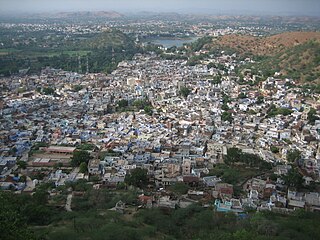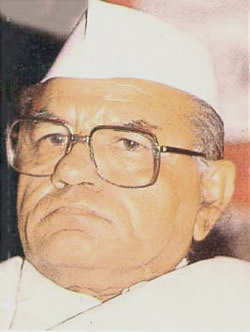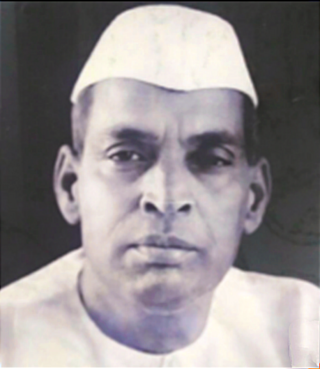
Dungarpur is a city in the southernmost part of Rajasthan, India.

Lakshmi N. Menon was an Indian freedom fighter and politician. She was Minister of State from 1962 to 1966. As delegate she held a speech at the United Nations General Assembly in December 1948 at the adotion of the Universal Declaration of Human Rights.

Mohan Lal Sukhadia was an Indian politician, who served as the Chief Minister of Rajasthan state for 17 years (1954–1971). He became chief minister at the age of 38 and was responsible for bringing major reforms and developments in Rajasthan. For this, he is still widely revered as the "founder of modern Rajasthan".

Hari Dev Joshi was a freedom fighter and an Indian politician from Indian National Congress. He was chief minister of Rajasthan three times.
D. R. Mehta is a former chairman of Securities and Exchange Board of India (SEBI). Mehta is a recipient of Padma Bhushan, one of the highest Indian civilian awards, for his contribution to social causes.

Manikya Lal Verma was a member of Constituent Assembly of India in 1949. He was prime minister of Rajasthan, India before full formation of the state. He was elected to Lok Sabha in 1957 from Chittorgarh and in 1952 from Tonk. He was recipient of Padma Bhushan in 1965.
Ratan Shastri, also called Ratandevi Shastri, was founder of Banasthali Vidyapith and a notable champion of women education. She was a notable woman freedom fighter of Rajputana and wife of Hiralal Shastri, first Chief Minister of Rajasthan. She was a recipient of Padma Shri in 1955, Padma Bhushan in 1975, and Jamnalal Bajaj Award for outstanding contribution in the field of uplift and welfare of women and children in 1990. Ratan Shastri was a strong pillar of Parajamandal Movement in Jaipur state during the Indian national Movement. She was a champion of female education and started a women's school, that later developed into a university, that contributed immensely to encourage and support female education in Rajasthan. She was a staunch adherent of Gandhian ideals and promoted Khadi.
Gokulbhai Daulatram Bhatt was a freedom fighter and a social worker from Rajasthan state in India. He was a member of Constituent Assembly of India representing Bombay State and chief minister of princely Sirohi state for a brief period. He was born in Hathal (Sirohi).
Narayandas Malkani (1890–1974) was a noted social worker and freedom fighter from Rajasthan state in India. He was an academic by profession. He was the eldest brother of K R Malkani. They hailed from Hyderabad, Sindh. He was conferred the Padma Bhushan award in 1973 by the Government of India. He was a member of Rajya Sabha for two terms.

Jayant Pandurang Naik, also known as J. P. Naik was an Indian educator.
Ashok Panagariya was an Indian neurologist, medical researcher and academic, known for his research on nerve cells and neuromyotonia. He was a vice chancellor of Rajasthan University of Health Sciences, Jaipur and a member of the Planning Board of the Government of Rajasthan. He was a recipient of the Dr. B. C. Roy Award, the highest Indian award in the medical category. Ashok Panagariya was awarded the fourth highest Indian civilian award of Padma Shri by the Government of India in 2014. He died on 11 June 2021 due to COVID-19 complications.

Sunil Janah was an Indian-American photojournalist and documentary photographer who worked in India in the 1940s. Janah documented India's independence movement, its peasant and labour movements, famines and riots, rural and tribal life, as well as the years of rapid urbanization and industrialization. He was best known for his coverage of the Bengal famine of 1943.
Lloyd Rudolph and Susanne Rudolph, known together as the Rudolphs, are American academians who extensively researched on Indian history and democracy.
Ratan Lal Joshi (1922-2006) was an Indian independence activist, journalist, writer. Born on 28 June 1922 at Churu, a desert city then in Bikaner State. Joshi was involved with the Indian freedom struggle from the age of 18 and suffered incarceration during the Quit India movement. Choosing journalism as a career, he joined Harijan weekly founded by Mahatma Gandhi and trained under the then chief editor, Kishorelal Bhai Mashrulawa. Later, he worked at several publishing houses and edited journals such as Bhai-Bahin, Samaj Sewak, Veer Bhoomi, Rajasthan, Rajasthan Samaj, and Kul Lakshmi. Lal kile main, Krantikari Prer ne Ke Srot and Mrityunjayee are three books published by him.

Shashi Bhushan (1924–2011) was an Indian independence activist, social worker, politician, writer and an institution builder. He was the founder of several organisations such as Rashtriya Ekta Samiti, All India Freedom Fighters' Organisation, Punjab Ekta Samiti and the Institute for Socialist Education, and represented Khargone and South Delhi constituency in the 5th Lok Sabha (1971–1977).

Prithvi Singh Azad (1892–1989) was an Indian independence activist, socialist revolutionary and one of the founder members of Ghadar Party. He suffered incarceration several times during the pre-independence period, including a term in the Cellular Jail. The Government of India awarded him the third highest civilian honour of the Padma Bhushan, in 1977, for his contributions to society.

Govindgiri, also known as Govind Guru Banjara, (1858–1931) was a social and religious reformer in the early 1900s in the tribal border areas of present-day Rajasthan and Gujarat states in India. He is seen as having popularized the Bhagat movement, which was first started in the 18th century.
Sundaram Ramakrishnan or S. Ramakrishnan was an Indian freedom fighter and social activist. He was widely known for his leadership to spread the values of Indian Culture globally as the director-general of the Bharatiya Vidya Bhavan and has been awarded both the Padma Shri and Padma Bhushan by the Government of India for his service to the nation.
Ram Narayan Chaudhary was a Gandhian social reformer, anti-colonial nationalist, writer, and publisher, from Rajasthan in India who contributed over three decades of his life to the Indian independence movement.










